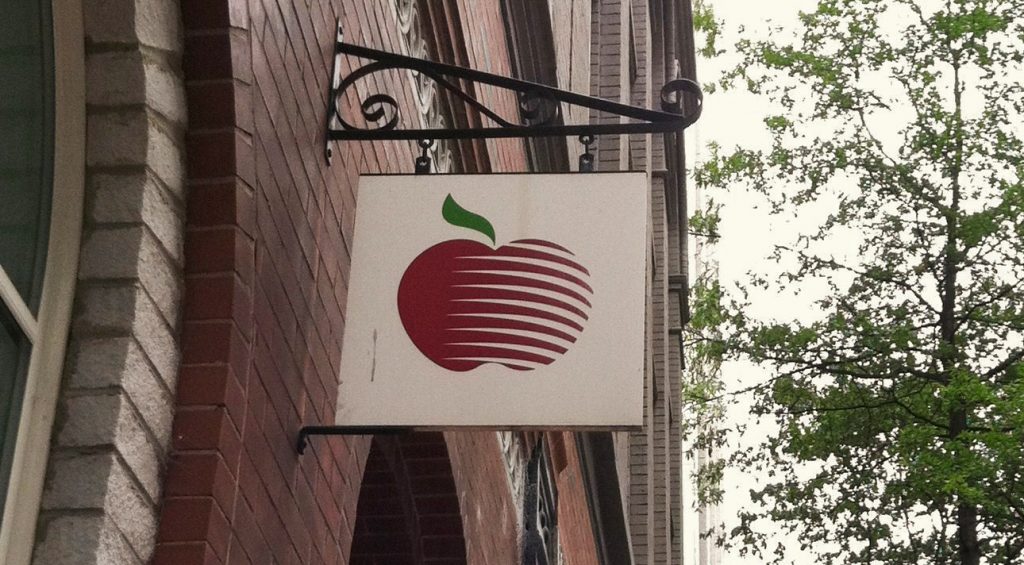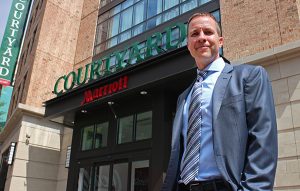A lawsuit challenging a downtown real estate firm’s $1.3 billion merger with its sister fund last year has netted an eight-figure settlement for the fund’s former shareholders.
The publicly traded Apple Hospitality REIT, whose 235 hotel properties nationwide include the downtown Richmond Marriott and the Courtyard Marriott and Residence Inn in Shockoe Slip, has agreed to pay $32 million to former shareholders of Apple REIT Ten, a non-listed real estate investment trust it absorbed last September.
The settlement, ordered March 16 in U.S. District Court, resulted from a lawsuit brought by James Quinn, a former Apple Ten shareholder and New York resident. Court filings state the settlement was reached just days before the case was set for trial, and describe it as “the largest derivative settlement in the Fourth Circuit.”
The suit, which named 10 Apple Hospitality directors and executives as defendants in addition to the company, alleged the merger was orchestrated by Executive Chairman Glade Knight – the founder of both companies and CEO and board chairman of Apple Ten – “in order to line his own pockets and those of other company insiders, including his son, Justin Knight.” Justin Knight is the CEO of Apple Hospitality.
According to the suit, the merger produced a $65 million windfall for Knight through the cashing out of Series B shares, of which he owned all 480,000 issued and outstanding. The suit says Knight assigned $16 million of that windfall to his son and longtime associates who were executives of both companies, which shared the same downtown office and staff.
The suit also alleged the merger’s $1.28 billion value resulted in Apple Ten shareholders receiving a price for their stock “well below its fair value.” As part of the merger, those shareholders were to receive 49.1 million Apple Hospitality common shares and $1 in cash per Apple Ten share. The suit alleged that the minimum fair price per share would be $12.50.
The suit’s original complaint, filed last July, alleged breach of fiduciary duty, and aiding and abetting those breaches of fiduciary duty. In addition to the companies and Glade and Justin Knight, the suit named as individual defendants Apple Ten directors Kent Colton, R. Garnett Hall Jr., David Adams and Anthony Keating III, and Apple Hospitality executives David Buckley, Kristian Gathright, David McKenney and Bryan Peery.
The filings do not specify the number of former shareholders to receive payment or the amount of those payments. They do state that 23,225 copies of a notice of the settlement were mailed to former shareholders and no objections were received among 150 phone calls fielded.
The settlement, ordered by U.S. District Judge John Gibney Jr., followed two negotiation sessions mediated by Magistrate Judge David Novak and three attempts by the defendants to have the case dismissed. Apple Hospitality denied any wrongdoing.
As part of the settlement, Quinn was awarded an additional $15,000, and his attorneys were awarded fees totaling $8.96 million – 28 percent of the settlement amount – and just over $430,000 in reimbursement for expenses.
Quinn was represented by Charles Williams of Richmond law firm Williams & Skilling, along with a team of attorneys with Pennsylvania-based Kessler Topaz Meltzer & Check. Williams declined to comment on the case.
The defendants were represented by McGuireWoods attorneys, including lead attorney Elizabeth Edwards of the firm’s Richmond office. The team also included Richmond-based Stanley Roberts and Brian Schmalzbach. Law firm Hogan Lovells represented Apple Hospitality specifically.
Messages left for Edwards and Hogan Lovells’ Mark Gately were not returned Tuesday. Apple Hospitality spokeswoman Kelly Clarke did not respond to requests for comment.
Last year’s merger consolidated the last remaining Apple REIT fund into Apple Hospitality, which was created in 2014 from the merger of three other funds: Apple REIT Seven, Eight and Nine. That year, Apple REIT Ten reached $1.05 billion in funds raised from investors and was closed off to new investors.
Apple Hospitality owns Marriott and Hilton hotels in 33 states. The previously non-listed REIT became a publicly traded company in 2015 with a listing on the New York Stock Exchange. It trades under the ticker symbol APLE and closed Tuesday at $18.60 per share.
The company’s annual revenue topped $1 billion last year, up from $898 million in 2015 and $365 million in 2012, according to SEC filings. Profits totaled $144 million in 2016, up from $117 million the year before and $75 million in 2012.
A lawsuit challenging a downtown real estate firm’s $1.3 billion merger with its sister fund last year has netted an eight-figure settlement for the fund’s former shareholders.
The publicly traded Apple Hospitality REIT, whose 235 hotel properties nationwide include the downtown Richmond Marriott and the Courtyard Marriott and Residence Inn in Shockoe Slip, has agreed to pay $32 million to former shareholders of Apple REIT Ten, a non-listed real estate investment trust it absorbed last September.
The settlement, ordered March 16 in U.S. District Court, resulted from a lawsuit brought by James Quinn, a former Apple Ten shareholder and New York resident. Court filings state the settlement was reached just days before the case was set for trial, and describe it as “the largest derivative settlement in the Fourth Circuit.”
The suit, which named 10 Apple Hospitality directors and executives as defendants in addition to the company, alleged the merger was orchestrated by Executive Chairman Glade Knight – the founder of both companies and CEO and board chairman of Apple Ten – “in order to line his own pockets and those of other company insiders, including his son, Justin Knight.” Justin Knight is the CEO of Apple Hospitality.
According to the suit, the merger produced a $65 million windfall for Knight through the cashing out of Series B shares, of which he owned all 480,000 issued and outstanding. The suit says Knight assigned $16 million of that windfall to his son and longtime associates who were executives of both companies, which shared the same downtown office and staff.
The suit also alleged the merger’s $1.28 billion value resulted in Apple Ten shareholders receiving a price for their stock “well below its fair value.” As part of the merger, those shareholders were to receive 49.1 million Apple Hospitality common shares and $1 in cash per Apple Ten share. The suit alleged that the minimum fair price per share would be $12.50.
The suit’s original complaint, filed last July, alleged breach of fiduciary duty, and aiding and abetting those breaches of fiduciary duty. In addition to the companies and Glade and Justin Knight, the suit named as individual defendants Apple Ten directors Kent Colton, R. Garnett Hall Jr., David Adams and Anthony Keating III, and Apple Hospitality executives David Buckley, Kristian Gathright, David McKenney and Bryan Peery.
The filings do not specify the number of former shareholders to receive payment or the amount of those payments. They do state that 23,225 copies of a notice of the settlement were mailed to former shareholders and no objections were received among 150 phone calls fielded.
The settlement, ordered by U.S. District Judge John Gibney Jr., followed two negotiation sessions mediated by Magistrate Judge David Novak and three attempts by the defendants to have the case dismissed. Apple Hospitality denied any wrongdoing.
As part of the settlement, Quinn was awarded an additional $15,000, and his attorneys were awarded fees totaling $8.96 million – 28 percent of the settlement amount – and just over $430,000 in reimbursement for expenses.
Quinn was represented by Charles Williams of Richmond law firm Williams & Skilling, along with a team of attorneys with Pennsylvania-based Kessler Topaz Meltzer & Check. Williams declined to comment on the case.
The defendants were represented by McGuireWoods attorneys, including lead attorney Elizabeth Edwards of the firm’s Richmond office. The team also included Richmond-based Stanley Roberts and Brian Schmalzbach. Law firm Hogan Lovells represented Apple Hospitality specifically.
Messages left for Edwards and Hogan Lovells’ Mark Gately were not returned Tuesday. Apple Hospitality spokeswoman Kelly Clarke did not respond to requests for comment.
Last year’s merger consolidated the last remaining Apple REIT fund into Apple Hospitality, which was created in 2014 from the merger of three other funds: Apple REIT Seven, Eight and Nine. That year, Apple REIT Ten reached $1.05 billion in funds raised from investors and was closed off to new investors.
Apple Hospitality owns Marriott and Hilton hotels in 33 states. The previously non-listed REIT became a publicly traded company in 2015 with a listing on the New York Stock Exchange. It trades under the ticker symbol APLE and closed Tuesday at $18.60 per share.
The company’s annual revenue topped $1 billion last year, up from $898 million in 2015 and $365 million in 2012, according to SEC filings. Profits totaled $144 million in 2016, up from $117 million the year before and $75 million in 2012.




